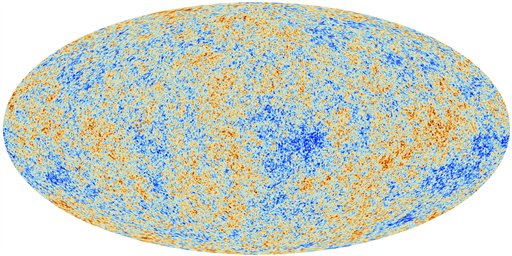PARIS – A new examination allows astronomers to tweak the age, girth and speed of the universe, more secure in their knowledge of how it evolved, what it’s made of and its ultimate fate.
The age of the universe is now calculated at 13.8 billion years — 80 million years older than scientists had thought.
It’s got about 3 percent more girth — technically it’s more matter than mysterious dark energy — and it is expanding about 3 percent more slowly.
But with all that comes the wisdom for humanity. Scientists seem to have gotten a good handle on the Big Bang and what happened just afterward, and may actually understand a bit more about the cosmic question of how we are where we are.
All from a baby picture of fossilized light and sound.
The snapshot from a European satellite had scientists from Paris to Washington celebrating a cosmic victory of knowledge Thursday — basic precepts that go back all the way to Einstein and relativity.
The Planck space telescope mapped background radiation from the early universe — now calculated at about 13.8 billion years old.
The results bolstered a key theory called “inflation,” which says the universe burst from subatomic size to its vast expanse in a fraction of a second just after the Big Bang that created the cosmos.
“We’ve uncovered a fundamental truth of the universe,” said George Efstathiou, director of the Kavli Institute for Cosmology at the University of Cambridge, who announced the Planck findings in Paris. “There’s less stuff that we don’t understand by a tiny amount.”
The map of the universe’s evolution — in sound echoes and fossilized light going back billions of years — reinforces some predictions made decades ago solely on the basis of mathematical concepts.
“We understand the very early universe potentially better than we understand the bottom of our oceans,” said Bob Nichols, director of the Institute of Cosmology and Gravitation at the University of Portsmouth in Britain. “We as humanity put a satellite into space, we predicted what it should see and saw it.”
Send questions/comments to the editors.



Success. Please wait for the page to reload. If the page does not reload within 5 seconds, please refresh the page.
Enter your email and password to access comments.
Hi, to comment on stories you must . This profile is in addition to your subscription and website login.
Already have a commenting profile? .
Invalid username/password.
Please check your email to confirm and complete your registration.
Only subscribers are eligible to post comments. Please subscribe or login first for digital access. Here’s why.
Use the form below to reset your password. When you've submitted your account email, we will send an email with a reset code.